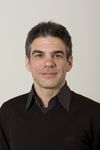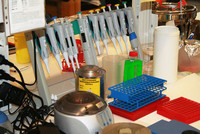Corrado Cilio
Immune complexity and mutiny fascinates

Corrado Cilio’s research focus is on the immunological mechanisms underlying autoimmune diseases.
“We need to learn how the immune system works in order to understand what happens when it doesn’t, when the body’s own tissues are attacked and people get sick”, says Corrado Cilio.
Corrado Cilio talks enthusiastically about the immune system as a liquid organ in contact with all parts of the body, and about the complex autoimmune diseases.“Type 1 diabetes is one example. It starts as an autoimmune disease but at the time of diagnosis it is endocrine. Between these two points there is a period when it is possible to try to stop the process, to intervene with an immunological treatment “, he says.
The perfect combination
Corrado Cilio has two jobs. When he talks about the second, being a pediatrician, he is just as enthusiastic.
“Working with patients and doing research is the perfect combination. They enrich each other”, he says.
When asked what he would choose if he had to, he squirms and says he can’t, that it is impossible.
“Both jobs mean as much for my motivation and enthusiasm. It would be hard not to have the daily contacts with children. I think my research would suffer from that as well”, says Corrado Cilio.
The defense makes a mistake
We wouldn’t survive without our sophisticated immune system whose billions of cells patrol every corner of the body looking for antigen; for intruders like viruses, bacteria, parasites and other foreign substances. Autoimmune means that the immune system makes an error, it mistakes friend for foe and attacks the body’s own tissues. The autoimmune diseases are common, also among children. Approximately one in twenty persons in the western world has an autoimmune disease.
Different tissues under attack
The autoimmune diseases include type 1 diabetes, where the insulin producing cells are destroyed, but also rheumatoid arthritis which affects the joints; multiple sclerosis, where the protective layer surrounding the nerve cells are attacked; and Parkinson’s disease in which the dopamine producing cells in the brain are killed. It is largely unknown why the defense commits mutiny and turns its weapons on self. But Corrado Cilio’s research aims to find out.
“It is the complexity of these diseases that makes it so exciting. Different parts of the body are attacked and the diseases affect everyone from children to the elderly.”
Not doing research full time

“The disadvantage of not doing research full time is that everything takes longer”, says Corrado Cilio and tells that it has happened that other scientists have beaten his group to investigating and publishing findings they have worked on for a long time.
“And then we have lost. Of course it is disappointing, but at least it is a confirmation that the ideas were correct.”
His research group at LUDC, the department of cellular autoimmunity, consists of eight people.
Doctor or musician
It was almost given from the start that Corrado Cilio would become a doctor, as both of his parents and his sister are doctors.
“I figured that if I was going to study anything at the university it would be medicine. But I also wanted to be a musician. Preferably famous and touring the world, except I am probably not talented enough. I think I have more talent as a pediatrician”, says Corrado Cilio. He has however, in spite of his busy schedule, continued with the music: electric bass, African drums and guitar.
Recruited to LUDC
Corrado Cilio came to Sweden from Rome in Italy where he studied medicine and started working on his doctoral thesis. He did one year of his specialist training in Umeå where he was offered to continue his PhD education. The next stop after the dissertation in Umeå was Lund University Diabetes Centre where Åke Lernmark and Leif Groop wanted to recruit him.
“I also got an offer from Toronto but my family had decided to stay in Sweden so the choice was fairly easy“, says Corrado Cilio.
Windy Skåne
His family, Corrado’s wife is Swedish, and both children moved to Skåne.
“Skåne is fantastic because it is so windy”, he says and explains his unusual point of view.
“Most of the time we don’t like the wind, but when you are kite surfing it is your best friend. Surfing offers a unique feeling of freedom.
He surfs at all seasons.
“But in a wet suit. I’m from Italy so the water needs to approach 25 degrees if I’m going to swim.”
Lack of vegetables and spontaneity
The Swedish winds might be appreciated but this is not true for the vegetables.
“In Italy we eat different vegetables depending on the season. I miss that, in Sweden it is the same all year round.”
Another thing he misses from Italy is the social spontaneity.
“You go knock on your friend’s door and spend some time together, in Sweden everything needs to be planned so far ahead.”
Prestigious award
Corrado Cilio is the first to receive “The Swedish Child Diabetes Foundation’s Johnny Ludvigsson-prize for excellent research in childhood and adolescent diabetes”. In addition to the honor and a diploma he will receive 50 000 Swedish crowns.
“It is a big honor”, Corrado Cilio comments the award.
The difficult choice
Johnny Ludvigsson, professor of pediatrics in Linköping and an active pediatrician, also divides his time between research and the clinic.
“I think it is good for the research”, says Corrado Cilio, who has now made up his mind.
“Yes, if I had to choose between the research and the patients I would choose the patients. I wouldn’t want to miss the inspiration that comes from meeting children every day. Imagine the rounds at the maternity ward. Getting to congratulate the parents to a healthy baby or helping a sick one – it is emotionally grand.”
Text: Tord Ajanki/Emma Ahlqvist
Photo: Stig-Åke Jönsson/MalmöBild